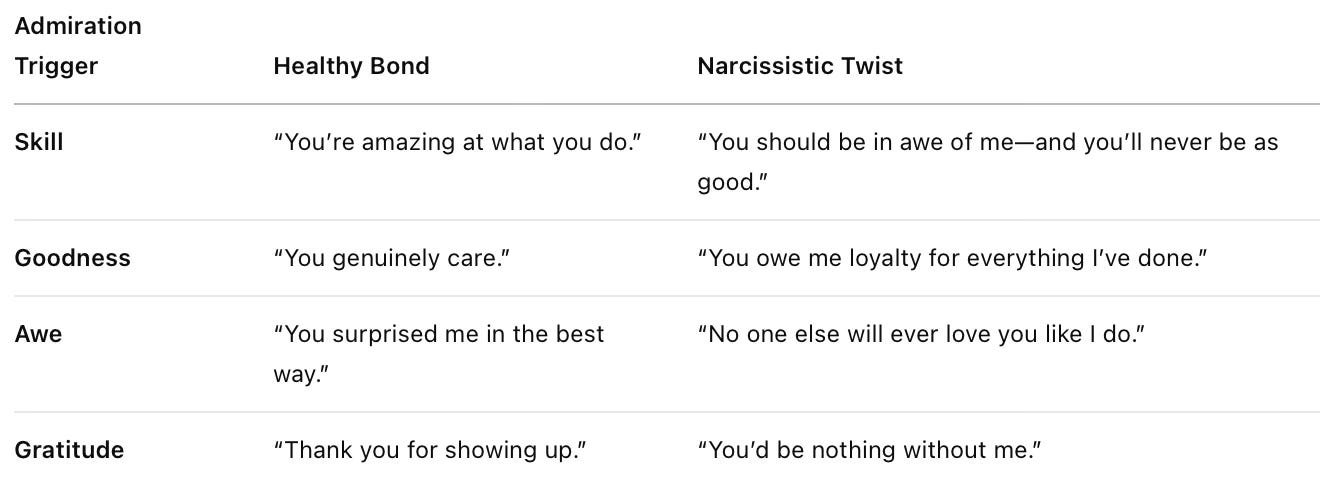Chapter 4: When Admiration Becomes Worship
From the THX Series Hub: The Narcissist’s Playbook & The Life After
Author’s Note
This post explores the line between admiration and emotional captivity.
If you were made to feel disloyal for having needs—or punished for setting boundaries—you may have been pushed past that line.
You are not disloyal for reclaiming your voice.
When respect turns into reverence—and love becomes a performance.
Admiration is healthy.
It inspires us. Connects us.
It’s one of the most powerful ways we bond with others.
But in narcissistic dynamics, admiration isn’t mutual or earned over time. It’s demanded.
And when admiration isn’t enough?
They escalate. They want worship.
My Experience
I admired her at first—her confidence, her strength, her command of a room.
But over time, it became clear: admiration was not optional.
If I disagreed, I was “unsupportive.”
If I succeeded, I was “competitive.”
If I didn’t praise her often or publicly, I was “cold.”
It wasn’t about appreciation.
It was about submission.
She didn’t just want to be loved.
She wanted to be followed.
The THX Breakdown: From Admiration to Control
Healthy admiration stems from real skill, goodness, awe, or gratitude.
But narcissists twist each one:
Signs It’s No Longer Admiration
You're afraid to give feedback—even lovingly.
You're expected to sacrifice constantly—without thanks.
You’re punished for outshining them.
Their “goodness” is always on display—but rarely felt behind closed doors.
You start questioning your own worth if they withdraw affection.
This isn’t love.
It’s a stage—and you’re expected to play your part.
Why Worship Is Dangerous
Worship destroys mutuality.
It makes one person the source of truth, safety, worth.
And it forces the other to abandon their own agency to maintain the illusion.
Worship demands silence in the face of harm.
It punishes honesty as betrayal.
It expects loyalty without safety.
Final Words
There’s nothing wrong with admiration.
But love is not worship.
And the person who loves you will never demand it.
They’ll celebrate your perspective.
Value your boundaries.
Encourage your independence.
And when you stop worshiping them?
They won’t call it betrayal.
They’ll call it growth.

Quick Links
Framework-based essays that decode the patterns, tactics, and predictable emotional logic of narcissistic behavior.
🔹 Chapter 1: The Illusion of Utility
Narcissists appear helpful, generous, and supportive—but what they offer isn’t true utility. This post unpacks how they simulate usefulness to create dependence, and how recognizing what was missing can be the first step toward freedom.
Using the lens of human flourishing, this piece explores how narcissists mimic love, meaning, and growth—not to connect, but to control. When every good thing gets twisted, how do you tell what’s real?
🔹 Chapter 3: Twisting the Admiration Equation
Admiration should feel earned, mutual, and expansive. But narcissists distort it into obligation. This post reveals how they manipulate skill, goodness, awe, and gratitude to extract loyalty—and punish doubt.
🔹 Chapter 4: When Admiration Becomes Worship
This entry shows what happens when admiration is no longer enough. Narcissists demand reverence, punish independence, and expect silence in the face of harm. Love is replaced by performance—and dissent becomes betrayal.
🔹 Chapter 5: Prospect Theory and Narcissism
Why do narcissists explode over small things? This post uses behavioral economics to explain how narcissists experience boundaries, autonomy, and truth as losses—and why they’ll do anything to avoid them.
🔹 Chapter 6: The Micro-Moment Manipulation
Sometimes what keeps us hooked isn’t the big promises—it’s the little moments. This piece explores how narcissists use micro-moments of affection and relief to reset your hope and obscure the harm.
🔹 Chapter 7: RKYC for Survivors
Originally designed as a business tool, “Really Know Your Customer” becomes a healing practice here. This post helps survivors rediscover their truth, needs, and voice—after years of emotional distortion.
A quiet offering for those who stayed too long, left too late, or are still trying to name what happened. This piece honors survivors, holds space for grief, and speaks to the person you used to be.
📖 Author’s Note & Series Closure
This final entry reflects on why the series was written, how the THX frameworks helped decode personal experience, and what it means to move forward—with clarity, dignity, and your story intact.




